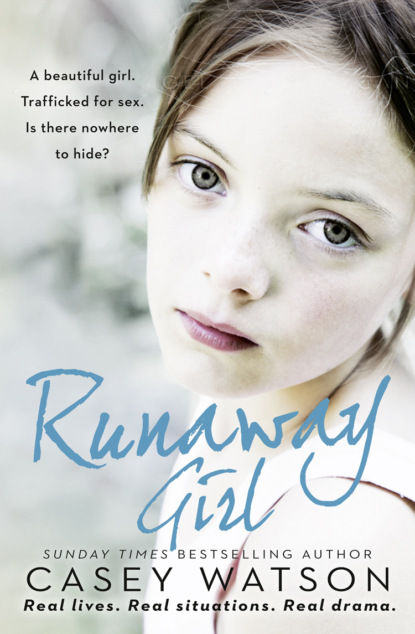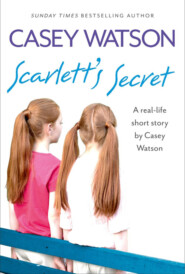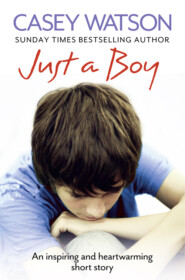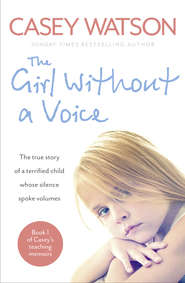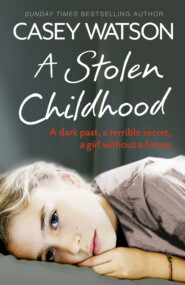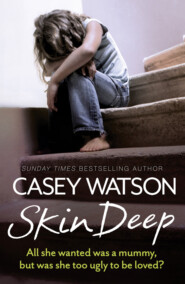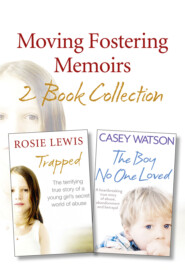По всем вопросам обращайтесь на: info@litportal.ru
(©) 2003-2025.
✖
Runaway Girl: A beautiful girl. Trafficked for sex. Is there nowhere to hide?
Настройки чтения
Размер шрифта
Высота строк
Поля
‘Or Romanian or Lithuanian … There’s so many of them now, aren’t there? Can’t bloody keep up with them. Basically the whole top half of the Eurovision Song Contest leader board,’ one of the other women chortled.
I stopped scanning the menu. ‘Makes no difference,’ my earlier interrogator commented. ‘They’re all the same, aren’t they? All come over here intent on stealing our bloody jobs. Do you know, Jean,’ she told the woman sitting opposite her, ‘my Simon got laid off from the crisp factory two months ago. Bloody eight years he’d worked there. Eight years! Then just like that,’ she snapped her fingers to demonstrate, ‘he was gone. Him and a fair few others, mind. Next thing we hear, only three weeks later they set a load of them bloody Eastern Europeans – that’s what’s they call them, or so our Simon says. I call them a bloody disgrace!’
They were talking to each other – not to me, not to Adrianna, but to each other. Which, ours being a free country, they had every right to do. But they were doing it sotto voce, clearly keen to be overheard.
So I decided to ignore them, even though I was seething inside.
Chloe, however, seemed to have other ideas. ‘Er, excuse me?’ she said. ‘Hello? We’re, like, just here?’
Donna and I both turned around. This was a turn-up. But the women appeared to ignore Chloe. ‘And not content with stealing jobs and taking benefits,’ the other one muttered, ‘they start dumping their kids on social services now as well.’
The other women – definitely not ladies – muttered their agreement, one even prodding a finger at the open tabloid in front of her. ‘Flipping disgrace, that’s what it is …’ An utterance that was followed by the evergreen, predictable ‘and on tax-payers’ money’. Donna and I exchanged looks.
‘Jen, would you mind?’ Donna said mildly, coming out from behind her counter. ‘You know – entitled to your opinions and that, but … well …’ She nodded towards the girls and made a small, almost apologetic, gesture.
‘Mum!’ Chloe said, anger flashing in her eyes.
I had some sympathy with my sister. After all, these were her regulars. Chloe, however, did not.
‘Mum, they are being outrageous!’ She glared at the three women. ‘How can you be so rude!’
‘We’re only stating facts, love. To each other. Not you.’
‘No you’re not!’ Chloe retorted. ‘You’re talking in stage whispers. On purpose! Fortunately, Adrianna doesn’t speak much English, but I do, and those are completely outrageous things to say!’
Go my niece!, I thought. One of the A levels she was doing was Law. She’d make a cracking lawyer, I decided.
‘Well, if the cap fits,’ said the first woman. ‘See, that’s half the problem. Why doesn’t she speak English? If these people refuse to integrate …’
‘Yet!’ Chloe snapped at her. ‘Yet being the operative word. And, frankly, I can hardly believe such utter rudeness. Racist rudeness. Makes me ashamed to be British.’
Whatever Adrianna thought of all this – whether she had managed to get the gist of it – she was keeping her counsel, standing impassively at Chloe’s side. For me, it was a blast. Go that niece of mine!, I thought again. Because the three women – who must have a combined age of pushing two hundred – were being seriously taken to task by an 18-year-old girl. I saw humiliation creeping into their expressions, even as they affected a look of indignant surprise.
‘Well, I think we’re about finished here, aren’t we, Jen?’ said the one who’d so far been the quietest. ‘Soup was cold anyway …’ she huffed, rising and scraping back her chair.
‘Good!’ Chloe said, glancing quickly at her mother as she said so. ‘So you’ll probably want to eat elsewhere in future, won’t you?’
If I’d been surprised before, I was open-mouthed at this. I glanced at Donna too – these customers were her livelihood, after all. But her expression was supportive and she made no move to intervene, even when the raised eyebrows on the woman called Jen seemed to suggest she might.
In the face of that, the three woman had no real choice but to bustle out, glaring at the other customers, whose expressions, hilariously, said it all. Indeed, as the bell on the door ding-a-linged to signal their departure, there was a necessarily small but heartfelt round of applause.
‘Oh, God, I’m sorry, Mum,’ Chloe said, immediately contrite and apologetic. ‘I just – grrr – I couldn’t help it. What racist old bags!’
‘Lord, don’t be,’ Donna said, raising her hand and doing a thumbs-up to the other, now grinning customers.
‘No, but I shouldn’t have kicked off like that. They do have a right to their opinions. And I know some people do feel very strongly about immigration, because they are at the sharp end of things, aren’t they? And there’s so little education. People just don’t know enough about the real facts. And this awful rag –’ She stabbed an angry finger towards the now abandoned tabloid. ‘But, God, they were just so rude!’ She turned back to Adrianna. ‘I mean, God, how would they like to be spoken about like that? Just bold as you like – with you standing right there in front of them!’ Her face then broke into a smile. ‘Sorry. Rant over. But I am sorry, Mum. I should have kept my cool a bit more.’
‘I told you, don’t be, love!’ Donna said again. ‘It’s no loss to me, really. Yes, they come in every week, but it’s only three bowls of soup, one pot of tea, no tip. So it’s no loss. I was tired of their constant bitching anyway. Frees up a table for a better class of customer.’
I had no idea how much Adrianna understood, but she clearly appreciated her feisty new champion. ‘Dzieki,’ she said. ‘Thank you. Thank you very much. You are so kind.’
‘And I’m hungry,’ I said. ‘So, speaking of cold soup, can you heat some up? Proper, mind. Or I’m straight off to TripAdvisor.’
We eventually sat down to (hot, delicious) soup and cheese toasties with salad, and spent a pleasurable hour putting the world to rights. ‘That’s why this bloody country is in the state it’s in,’ Donna ranted, warming to the theme, ‘through the ignorance and intolerance of bloody fools like them.’
Chloe grinned. Like mother, it now seemed, like daughter. She really would make an extremely good lawyer. As for Adrianna, perhaps more of a diplomat’s role. ‘But there are not so many like this,’ she said, in her soft, halting English. ‘Great Britain. Great people.’ She smiled at us all. ‘This is true.’
I squeezed her arm. I sincerely hoped it would prove to be.
Chapter 5 (#ulink_0ba34e37-7f6b-5861-824c-cd8d585fc2c8)
It’s not up to me, obviously, to make such decisions, but the incident in Donna’s café made me doubly sure that I should push no one about moving Adrianna on for now. Yes, in financial terms, she was indeed ‘a burden on the state’, but she was a tiny one in the scheme of things. And, in reality, left to fend for herself, she might be costing society even more. As a runaway on the streets the costs might not be so obvious, but they were there nevertheless, both in the short term and the long term, because kids on the streets were so often the victims of greater crimes – drug pushers, who’d get them hooked and then force them to commit petty crimes, usually theft, to create a steady income.
And even if they weren’t sucked into drug use, they were still on course to become a greater drain on society; down the line, adrift and homeless, they’d often be unemployable, develop mental health problems and generally fail to become useful members of society.
And that was true of all kids who’d had a bad start in life. Most runaways were home-grown, after all – victims of a canker that was alive and well in our own country too. Which was why social services were always at full stretch.
‘Blimey,’ said Mike, when I ran my thoughts by him a couple of nights later. ‘Are you planning to stand for parliament or something?’
I laughed, but there was a kernel of truth in his comment. Having listened to Chloe, and the passion with which she responded to knee-jerk racism, I had thought long and hard about exactly where Adrianna should fit in, and how I could – or should – justify our taking care of her.
Happily, when I spoke to John and suggested we didn’t rush things with Adrianna, he agreed. ‘And you’re right,’ he said. ‘In terms of cost, she’s in the best place at the moment. So if you’re in no rush to move her on, I’m in no rush to try to do so. It sounds like she’s settling in well, and, from what you tell me, in no rush to move on either.’
‘Absolutely not,’ I agreed. ‘Though one thing – she’d love to go to school again. Is that feasible?’
‘Complicated,’ John said, ‘but quite possible. The thing is that we have no idea of her educational background. She might not have gone to school for years as far as we know, and she isn’t very forthcoming about all that, is she?’
‘No, but she might be – if she thought she could go to school with Tyler, she might be. Plus there are Poles at his school she can make friends with, don’t forget.’
‘Good point,’ John conceded. ‘Tell you what, leave it with me. I’ll speak with ELAC and see what they have to say.’
ELAC – yet another of the acronyms we bandied about – stood for the Education for Looked After Children team. I’d had all sorts of dealings with ELAC over the years, and, unlike CAMHS, who often felt like the proverbial stone you wanted blood from (not their fault, they were the very personification of the word ‘overstretched’), ELAC were always on top of their game, because schools often had spaces and everyone knew that a child in full-time education was in a markedly better place than one who was not. I mentally crossed my fingers. Her going to school might be key.
One thing was clear, though. That there was no need for an interpreter to return to us. Adrianna might only have basic English but with Tyler so keen to help her, and the extended family too (not least via the language of enthusiasm and encouragement), we could, I knew, get by just fine. And, I was sure – and I said as much to John – I would eventually get her to tell us more about her past. Not to mention, of course, that the only interpreter currently on offer was a grumpy old man. I’d rather muddle along as we were, thank you very much.
In the meantime, the present was looking good. Though Levi and Jackson were in school full time – as, obviously, was Tyler – there was always plenty going on with my two grandaughters. And Adrianna hadn’t just struck a chord with Marley Mae, either. She loved being around little Dee Dee as well. Which, with our youngest grandchild soon to be one and on the very brink of walking, was a great help – extra pairs of watchful eyes being very much in demand.
My relationship with Lauren, always good, had moved to an even deeper closeness since the baby had been born, and, to my delight, she and Dee Dee visited often during the week, when Kieron was at work. Lauren herself, to help make ends meet, was still working flat out as a dance teacher, running classes several times a week for three- to ten-year-olds, but during the daytime I felt blessed that she was around so much, and I could watch my youngest grandchild grow and blossom.
Adrianna seemed to feel the same and, over the next couple of weeks, it was all about little-girl stuff. If it was raining we’d stay in and play endless games of shops and ‘house’, and when it was fine we’d wrap the girls up and often visit the park to play on the swings, and usually – Marley Mae’s favourite thing, currently – to feed the park’s many ducks and swans, not to mention the flocks of geese that had come to spend the winter with us from more northerly climes.
‘To where it’s warmer,’ I heard Adrianna explain to Marley Mae as they threw bits of bread to the greedy web-footed hordes that ringed the boating lake. ‘This is why they come to Britain.’
‘Like you!’ Marley Mae enthused.
‘Like me. From far, far away. From the cold.’
‘Cold,’ Marley Mae parroted, stamping her feet in her little welly boots and going ‘brrrr’.





